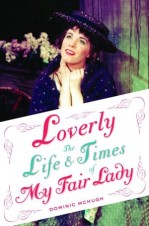 Oxford University Press recently released Loverly: The Life and Times of My Fair Lady to mixed but generally positive reviews. Using previously unpublished documents, author Dominic McHugh presents a new, behind-the-scenes look at the five-year creation of My Fair Lady. He charts the show from the aftermath of the premiere of George Bernard Shaw’s Pygmalion and the playwright’s persistent refusal to allow it to be made into a musical, through to the quarrel that led lyricist Alan Jay Lerner and composer Frederick Loewe to part ways halfway through writing the show, up to opening night and through to the present.
Oxford University Press recently released Loverly: The Life and Times of My Fair Lady to mixed but generally positive reviews. Using previously unpublished documents, author Dominic McHugh presents a new, behind-the-scenes look at the five-year creation of My Fair Lady. He charts the show from the aftermath of the premiere of George Bernard Shaw’s Pygmalion and the playwright’s persistent refusal to allow it to be made into a musical, through to the quarrel that led lyricist Alan Jay Lerner and composer Frederick Loewe to part ways halfway through writing the show, up to opening night and through to the present.
Gerald Bartell (Washington Post): Dominic McHugh, who lectures in music at the University of Sheffield, eschews gossip in his account and takes a scholarly tack in a book that originated as his doctoral dissertation at King’s College, London. He pores over hundreds of primary sources: letters, contracts, script outlines, score annotations and songs used, revised or discarded. And from these myriad documents he constructs a record of the show’s history that’s illuminating, perceptive and valuable, yet also inert and colorless. … McHugh’s work is painstaking, and at times that’s a problem. Thousands of facts weigh down the tale of what is, after all, a buoyant musical play.
Alan Gomberg (Talkin’ Broadway): This book probably will not especially appeal to those looking for a light read filled with tales of backstage and onstage intrigue and mishaps. Loverly is serious business. … Here and there are some mildly problematic statements on factual matters … but none detracts in any significant way from the overall accomplishment. Despite those reservations, there’s so much to recommend about this book that I feel a bit ungrateful to be carping, so I will close by emphasizing that Loverly’s strengths substantially outweigh its weaknesses. McHugh deserves our gratitude for the immense amount of new information he provides.
Michelle Jones (Dallas News): McHugh stresses that Frederick Loewe was a relentless editor. … The author could have used a similarly keen eye: Loverly reads like a dissertation in some places, and a degree in music would come in handy in others. Still, using published and unpublished scores, rehearsal notes, reams of correspondence and other archival materials, McHugh presents a revealing look at the intricacies of writing and staging the production. … Lerner and Loewe’s triumph, he says, was in transforming the complex play into genre-stretching musical theater – writing a classic Broadway musical without writing “standard types of Broadway songs.”
